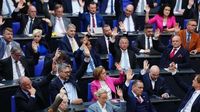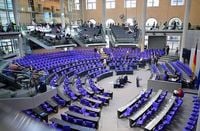In a significant political shift, the Alternative for Germany (AfD) party has been officially classified as a "gesichert rechtsextremistisch" (confirmed right-wing extremist) organization by the Bundesverfassungsschutz (Federal Office for the Protection of the Constitution). This classification, announced on May 7, 2025, has already prompted a notable reaction: the resignation of Sieghard Knodel, a newly elected member of the Bundestag from Baden-Württemberg, from both the AfD parliamentary group and the party itself.
Knodel, who was elected in February 2025, expressed his decision in an email, stating, "Given the classification of the party as right-wing extremist, I must protect my private and business environment." He emphasized that while he viewed his departure as unavoidable, it was not a decision he took lightly. Knodel will continue to serve his mandate in the Bundestag as a non-aligned member, which reduces the AfD's representation from 152 to 151 members.
The AfD had nearly doubled its seats in the Bundestag from 77 at the end of the previous legislative period to 152 in the February elections. The party's rise has been a point of contention in German politics, and this latest classification has intensified discussions about its future.
In light of the new classification, the Berlin SPD state executive committee has called for concrete preparations for a ban on the AfD. Nicola Böcker-Giannini, the SPD state chairwoman, stated, "Should the classification of the AfD, which is likely to undergo judicial review, prove to be legally sound, we must draw the necessary consequences." She called for an immediate initiative in the Bundesrat to prepare a legally secure application for a party ban against the AfD, asserting that the party's ideology is incompatible with the principles of a free democratic order.
Meanwhile, the AfD has taken legal action against this classification, submitting a letter to the administrative court in Cologne. Daniel Tapp, a spokesperson for party leader Alice Weidel, confirmed this development. Despite the controversy, leading Union politicians have expressed caution regarding a potential ban on the AfD. Alexander Dobrindt (CSU), the designated Federal Minister of the Interior, remarked that to pursue a ban, it must be proven that the party's essential characteristic is an aggressive stance against democracy. He noted, "There are no blanket consequences for civil servants who identify with the AfD."
In contrast, Nancy Faeser, the outgoing Federal Minister of the Interior from the SPD, has advocated for a careful examination of the possibility of an AfD ban, emphasizing that there is no automatic process in place. CDU General Secretary Carsten Linnemann has also expressed skepticism about a ban, arguing that many voters support the AfD as a form of protest, which cannot simply be legislated against.
The political landscape continues to shift as the AfD faces declining approval ratings following its classification as right-wing extremist. A recent poll conducted by the Insa Institute for the "Bild" newspaper indicated that the AfD lost 0.5 percentage points, now standing at 24.5%. In comparison, the Union also experienced a decline of 0.5 points, while the SPD saw a slight increase to 16%.
Knodel's departure from the AfD reflects a broader concern among party members regarding the implications of the classification. The potential for increased scrutiny and monitoring by the Bundesverfassungsschutz could pose significant risks to the personal and professional lives of those associated with the party. As Knodel stated, the need to protect his "private and business environment" played a crucial role in his decision to resign.
Knodel, who has been active in various capacities across Baden-Württemberg, is known for his work in the aerial work platform industry, which he founded 30 years ago. His company has been involved in several high-profile projects, including Stuttgart 21 and various celebrations. This background has garnered him support within the party, as evidenced by a fellow party member who noted that his company had assisted in putting up election posters.
The classification of the AfD as right-wing extremist has reignited discussions about the party's future and its alignment with democratic values. Politicians from various parties are weighing the implications of this classification, with some advocating for a ban while others caution against such measures.
As the political landscape evolves, the AfD's ability to navigate this challenging environment remains uncertain. With Knodel's resignation marking a significant moment in the party's trajectory, the coming weeks and months will likely see intensified debates over its status and the potential for further legal and political actions against it.
In summary, the AfD's classification as a right-wing extremist organization has led to immediate repercussions, including the resignation of a key member and calls for a potential ban. The situation continues to unfold as political leaders and the public grapple with the implications of this classification and the future of the party within Germany's democratic framework.



